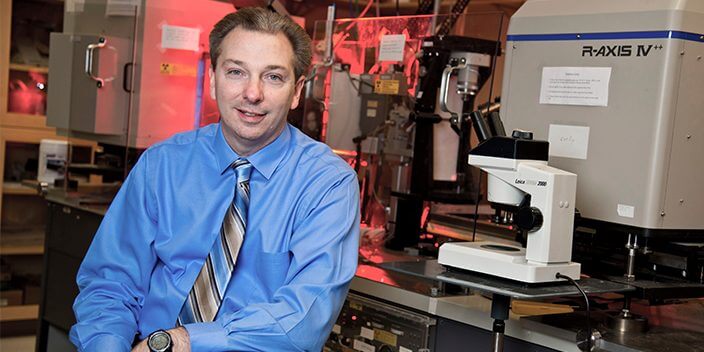Mesecar named interim director of Purdue Center for Cancer Research

WEST LAFAYETTE, Ind. — Andrew Mesecar, the Walther Professor in Cancer Structural Biology, will serve as the interim director of the Purdue Center for Cancer Research (PCCR) during the current national search for a permanent leader.
Mesecar, who has served as deputy director for the PCCR since 2010 and formerly as department head of biochemistry, is a leader in basic research on the structure and function of enzymes involved in disease, as well as targeting these enzymes with drugs using structure-based design approaches. His new role with the PCCR began Aug. 15.
“I’m delighted that Andy has agreed to take this role,” said Theresa Mayer, executive vice president for research and partnerships. “His extensive leadership experience as deputy director and department head will ensure that the center will continue to thrive during this time of transition.”
Mesecar assumes the role of interim director for Tim Ratliff, who stepped down as PCCR director after leading the center for 14 years. Ratliff returned to his distinguished professorship in the Department of Comparative Pathobiology in the College of Veterinary Medicine.
“I am deeply honored to be appointed the interim director to the PCCR which has been a home to me for the past 12 years as deputy director,” Mesecar said. “The PCCR is going into its 45th year as a designated basic cancer center for the National Cancer Institute and my number one goal is continued success for the center, its 114 faculty and their research programs.”
The PCCR is among the nation’s leading institutions in cancer-related drug development. The center’s scientists currently are developing 26 immunotherapies and 37 drugs, including 11 in human clinical trials.
Purdue Center for Cancer Research
Since 1978, the PCCR has been a National Cancer Institute-designated Basic Laboratory Cancer Center. Only seven institutions in the United States have earned this title and Purdue is the only public institution in this prestigious group. The center’s work focuses on investigating the cause of cancers where they begin — at the cellular level — and developing novel treatments and diagnostics for one of the most devastating diseases of our time.
The center leverages Purdue’s many strengths in engineering, veterinary medicine, biochemistry, nutrition science, chemistry, medicinal chemistry, structural biology and biological sciences to support its robust and ambitious research.
Doctors and scientists throughout the world currently use PCCR discoveries to develop methods, medicines, and medical devices to improve and save lives.
Writer: Amy H. Raley, araley@purdue.edu
Source: Andrew Mesecar, amesecar@purdue.edu